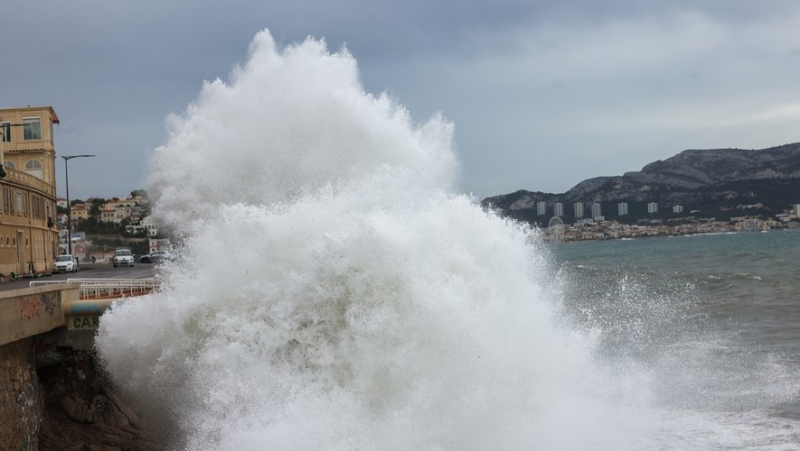Global warming: France is building the plan that will prepare it for 4°C more in 2100

The Mediterranean shore will be increasingly exposed to the risk of marine submersion. MAXPPP – Sylvain Rostaing/Le Pictorium
Reducing our greenhouse gas emissions remains fundamental, but France must prepare for increased natural risks, the inevitable consequences of global warming. Anticipation which must preserve people, property and activities, in particular. Stopover this Tuesday, at the National Museum of Natural History, in Paris.
An average annual temperature 4°C higher than that of the pre-industrial era, in 2100 in France. This is nothing like a science fiction theory, except to lock yourself in "denial", insists the Minister of Ecological Transition, Christophe Béchu, this Friday morning. We are, he says, taking up a warning issued by the UN at the end of 2022, on "a trajectory between 2.8° and 3.2° of warming" on a planetary scale, rather than the 1.5° of the Paris agreements or the 2° still considered recently. This trajectory "could" lead to "an increase in the temperature, here, of 4°", continues the minister, with Europe and France warming up more faster than the rest of the world. "We have no option but to adapt."
#le710inter | @EmmanuelMacron a été le premier Président de la République à parler d'un sujet qui a été le parent pauvre de la transition écologique, c'est l'adaptation aux conséquences du dérèglement climatique. pic.twitter.com/EXEI5lyJyR
— Christophe Béchu (@ChristopheBechu) January 17, 2024
Around fifty measures
This is the subject of the third version of the National Plan for Adaptation to Climate Change (Pnacc), which the government intends to adopt and publish immediately ;here in the summer and that he has been working "for a year". The schedule envisages a presentation at Matignon at the end of February, for a "arbitration time"interministerial, a "consultation of the general public at the beginning of spring", which will also involve the involvement of sectors particularly exposed – economic world, health or education, cites the office of Christophe Béchu -, with, to refine the final contours, a meeting this Tuesday. Researchers, parliamentarians, NGOs, insurers or local elected officials, 350 actors will pose on the table of the National Museum of Natural History, in Paris, their reflections, their questions, their suggestions, to explore "adaptation solutions".
The plan to be born must draw, in "around fifty measures", envisages the minister, the path to follow so that the country is able to face the consequences of the natural risks that such a rise in temperatures will imply on populations, biodiversity, economic activities, public services or ;nbsp;goods. A France prepared not tomorrow, but gradually, according to a trajectory which will then have to be translated into laws, decrees, circulars and other technical standards – those of the building industry, for example, or even the Labor Code -, to "avoid waste", "the cost of inaction", that of&# 39;a "bad adaptation". The choice of wood species that we will plant tomorrow will determine the ability of our forests to withstand the warming of our climate in 2100, Christophe Béchu notably illustrated.
From floods to heat waves
The fields of this adaptation are immense. We know that violent climatic events will be more and more frequent, they already are; the drought current since 2022 in the South, the sequence of torrential rains in the Pas-de-Calais at the start of 2024 are enough to demonstrate this. The plan will integrate "heat waves, management of heatwaves", specified the tenant of the Roquelaure hotel, "we have subjects of flooding", submersion and marine erosion, fire, of drought, "a considerable field which is that of the shrinkage-swelling of clays. Nearly eleven million properties are exposed to this risk, which is increasing exponentially..
A non-exhaustive list, where Languedoc and Roussillon can be recognized in the smallest of items…
I subscribe to read more




